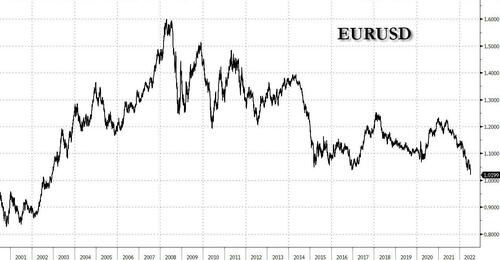Rabobank: What About Deflation?
By Elwin de Groot, Head of Macro Strategy at Rabobank
When we invoked Mundell & Fleming’s “Unholy Trinity” of i) independent monetary policy, ii) a fixed (stable) exchange rate and iii) the free movement of capital in yesterday’s Global Daily, we couldn’t have been timed better. Although we actually applied the type of reasoning to the ECB’s aims of setting rates (and spreads), controlling the amount of base money and trying to prevent fragmentation at the same time, it was the original Mundell-Fleming type that put its mark on markets yesterday.
Of course we are talking about the EURUSD exchange rate which fell straight through the 1.035 ‘technical barrier’ (a previous low set late 2016, early 2017) all the way to a 20-year low of 1.0240, leading to speculation among market participants that parity is now “within reach”.
The reason behind the currency’s weakness is the growing doubt in the market that the ECB may be able to push through a series of rate hikes –which, as a reminder, it has yet to start– before any recession kicks in. The yield on 2-year German Schätze fell more than 15bp to 0.43%. Our FX strategist, Jane Foley, notes that while we have been warning of recession risks in the Eurozone for some time, broader market concerns surrounding from energy security in Europe have been hitting home in recent sessions. This in turn is focusing attention on Eurozone fragmentation risks and the tricky policy position of the ECB, all of which is EUR negative.
And what about deflation? That’s a surprising question I got from a Dutch client last week and it even caught me off-guard. But they were right, it’s not a scenario to be entirely dismissed for 2023. Newton’s Third Law of Motion, which states that when one body exerts a force on another body, the second body exerts a force on the first body that is equal in magnitude but opposite in direction, often can be applied to economies and markets as well. This is not to say that this means things are predictable (far from it!), but it does remind us of the possibility that what goes up, can also come down.
So is ‘demand destruction’ now at work? Well, perhaps were seeing the first signs of it. Although headline PMI surveys in Europe are still “above 50”, forward-looking indicators such as order-intake and export orders in industry have fallen below that threshold in recent months. In any case, many commodity prices are seemingly experiencing Newton’s law of gravitation. Brent oil fell below $105 a barrel (end-June it was still trading at EUR 120), base metal prices (notably copper) are sliding and even agri commodities have fallen quite sharply over the last several weeks. For the latter, a case in point is palm oil, which is down 40% since its intraday record set in May. The reason: Indonesia raised its export quotas in order to get rid of excess stockpiles – which themselves are the result of its temporary export ban in April-May. Talking about action-reaction.
Of all major base metals and agri-commodities including, believe it or not, wheat and softs such as sugar and cotton, there is only one commodity whose (nearest-term future) price is still above the levels recorded just before war in the Ukraine broke out: iron ore. It is therefore no surprise that Bloomberg’s broad commodity price index has now fallen all the way back to 112.4 (it stood at 113.5 on 22 February), after having reached 136.6 on 9 June. In other words, in less than a month, all commodity price gains since the Ukraine war have been wiped out.
The last big ‘hold-out’ in that respect is European energy. The 1-m forward benchmark contract for European gas briefly jumped above $170 yesterday, which is the highest level since 8 March. A strike by Norwegian offshore workers that started Monday and broadened Tuesday was arguably the immediate cause for the jump in gas prices, but this comes against the backdrop of fears that Russian supply through Nordstream-1 may not come back on after maintenance work on the pipeline has been finished later this month. Norway is the UK’s largest gas supplier and is now also responsible for around 25 percent of European mainland’s gas, second after Russia, the FT reports. The positive news this morning, though, is that the Norwegian government has intervened in the industrial conflict (it has the power to do so under certain conditions), proposing ‘compulsory wage arbitration’ between the Lederne union representing the sector’s workers and employers. How much is securing the supply of a crucial input to everyone involved worth? I guess that is a question that will be asked a lot more in what looks like already being a hot European summer.
Meanwhile, UK PM Johnson may also be sweating – not just because of the summer heat. Although he has been under fire for months, Johnson still enjoyed the support of his cabinet members for a long time. This support is now crumbling. Last night, Health Minister Javid and Finance Minister Sunak resigned almost simultaneously out of dissatisfaction with his leadership. Replacements were immediately appointed in the persons of Barclay and Zahawi, but given the ongoing unrest, the question is how long they can enjoy their new office. It could mean that the government will come up with popular measures, such as another tax cut, in an effort to regain the confidence of voters and party members. Remarkably, traders in the British pound showed little sympathy for Prime Minister Johnson last night. There was no price reaction and EUR/GBP is now trading just below 0.86. This suggests that the British economy might be better off with a new prime minister.
Tyler Durden
Wed, 07/06/2022 – 09:30
via ZeroHedge News https://ift.tt/zjsmVo9 Tyler Durden
